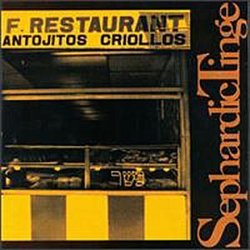| All Artists: Anthony Coleman Title: Sephardic Tinge Members Wishing: 1 Total Copies: 0 Label: Tzadik Original Release Date: 6/20/1995 Re-Release Date: 5/23/1995 Genres: Folk, International Music, Jazz, Special Interest, Pop Styles: Jewish & Yiddish, Avant Garde & Free Jazz, Modern Postbebop, Bebop Number of Discs: 1 SwapaCD Credits: 1 UPC: 702397710226 |
Search - Anthony Coleman :: Sephardic Tinge
 | Anthony Coleman Sephardic Tinge Genres: Folk, International Music, Jazz, Special Interest, Pop
|
Larger Image |
CD Details |
CD ReviewsEloquent piano trio music N. Dorward | Toronto, ON Canada | 10/02/2001 (3 out of 5 stars) "This recording features John Zorn's frequent collaborator, the pianist Anthony Coleman, in a trio with Greg Cohen & Joey Baron. In Zorn's groups Coleman was often employed because of his ability to switch quickly between different styles--there's a memorable moment on _Spillane_, for instance, in which Coleman manages to send up cheesy cocktail piano in a matter of seconds before the next style-shift. _Sephardic Tinge_ attempts a rather soberer mixture of Jewish, Spanish & jazz traditions. It's very well-done. There are a couple of jazz standards which draw on Spanish rhythms--Monk's "Bye-Ya" & Jelly Roll Morton's "Bert Williams"--& they're given good readings; there's also a whimsical improvised collage of the chord-changes to various popular jazz standards called "Ask Anthony 2". Coleman's touch on these tracks, & especially his left-hand figures, suggests that he's listened carefully to the early recordings of Cecil Taylor (especially _Jazz Advance_). The heart of the album, though--what makes it stand out--are the pieces furthest from jazz. The two Sephardic melodies that bookend the album are especially lovely--interesting to compare "Una Matica De Ruda" to Ran Blake's versions of the theme.I don't think this recording works its way up into the top bracket of piano trio music. But it's nonetheless worth a listen." Addictive ptitchitza | Leiden, Netherlands | 07/24/2000 (5 out of 5 stars) "Second CD release of Zorn's exciting and (musically) adventurous record company Tzadik is a CD of Anthony Coleman Trio, recorded in 1993-4 and released a year later within Tzadik's "Radical Jewish Culture" edition. Joined with the rhythm section of John Zorn's Masada quartet (Greg Cohen, b; Joey Baron, d), it's the first time that Coleman, a very versatile and creative musician, uses a format of a classic jazz piano trio. Coleman: "(...) I started thinking about the music which had accompanied most of my life in some way or another. I thought about the fact that the Mambo and Cha-Cha had both been dance crazes in the Borscht Belt during the '40s and '50s. I thought about Sephardic (Spanish) Jews and how strange and mysterious I had always found the idea of their language, Ladino. I added to this the uses that Jazz composers have made of what Jelly Roll Morton called the "Spanish Tinge", Habañerea and Mambo patterns, montunos... "The 9 compositions of the album consist of Coleman's beautiful and moving renditions of three traditional Sephardic songs, 4 originals and two songs of undoubtedly important influences on Coleman: Jelly Roll Morton and Thelonious Monk. The range of emotions in these compositions and the original and daring interplay of the three brilliant musicians make me reach for this CD very often, even though I have it for years. Coleman's piano SINGS in the Sephardic songs and his own composition, "Sarajevo". The energy, rhythm and "dysfunctional" harmony of "Ladino Passacaglia" and "Doina" define a kind of musical adventure that I'm looking for. Great stuff.Something tells me you might want more, in which case please note that Coleman's second collection of this undertaking is called "Morenica", by Coleman's (changed) trio, Sephardic Tinge." The anxiety of the improvisor Reckless DC Music | Whitneyville, CT USA | 01/20/2000 (5 out of 5 stars) "I have long been an admirer Anthony Coleman's music, but this piano trio was the first of his self-lead ensembles to really grab my ear. Coleman's sense of melodic development reveals a broad range of sources. Thankfully, he is not another 50s hard-bop clone (not that 50s bop is a bad thing mind you). His work displays a musical and aesthetic depth that is moving as well as intellectually stimulating and his avoidance of klezmer to make a Jewish musical artistic statement is bold. What you hear is that he put some thought into what he was going to do. And in this thought process is the dilemna of the modern improvisor, how self-conscious do we become. Coleman seems to have crossed this hurdle with great musical and intellectual aplomb. The eclectic mix of musical sources: original compositions, sephardic melodies and jazz standards is part of Coleman's aesthetic stance and all of the musical sources are treated with equal musical reverence and irreverence. Coleman's got a great pair of accompanists in Joey Baron and Greg Cohen and its clear that everyone is listening to another and making music together. No matter how you dig into it, this is a strong album."
|

 Track Listings (9) - Disc #1
Track Listings (9) - Disc #1